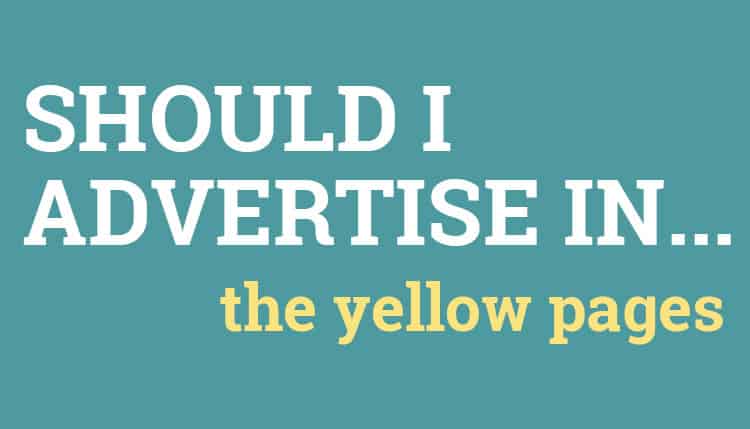Should I Advertise In… The Yellow Pages
The Yellow Pages once held a dominant place in local marketing. We review what's changed, and if there still can be value found in the book.
Get a Free Marketing Analysis and Consultation
Nowspeed can review your Website, SEO, PPC, Email or Social Media Campaigns and identify ways to make an immediate impact!

This post is part of a series in which we get down and dirty to answer the questions that all businesses are asking: where can I best spend my marketing budget? Every day, business owners are bombarded by salespersons telling them why their platform or print publication is THE BEST place to advertise. So we’re going to do our best to dispel the myths and rumors and get to the heart of each marketing venue, and explore if, and why, it’s a good investment for your money. And, these articles will assume that you do not have an unlimited marketing budget, so you have to choose one venue over another. So, without further ado…
The Yellow Pages – Then and Now
Long ago, there was a time when people used devices, connected to a spiraled wire, to communicate with one another verbally. Believe it or not, these devices were called “phones” – the same thing we call that small computer that you stare at as you aimlessly walk into traffic. In all seriousness, the Yellow Pages was at one time the premier directory people would reference to find businesses that offered services they needed. The book was huge, and at the time, often included the “white pages” – a directory of all local residential phone numbers. It was a useful tool, and a surefire way to get your business listing in front of everyone who needed your services.
Nowadays, the phone book isn’t nearly as prevalent or relevant as it once was. When the internet was becoming a widely-used source of information, the book saw a decline in usage, but it was still fairly popular due to its white-pages section, as the phone companies didn’t actively publish residential numbers online. But over the last 20 years, the shift from land-lines to cell phones has been huge – over 96% of US adults have cell phones nowadays, and 81% have smartphones. On the other hand, just under 40% of American households have landlines. What does that mean? Cell phone networks aren’t managed (usually) by the same companies that publish the phone book – phone books succeeded because in a region, only one phone company was the primary service provider (like cable companies today); cell phones have a large variety of providers in an area. Add the different rules and regulations governing cell phone numbers being publicly available, and the result is that there is no longer an effective way to distribute a printed directory of phone numbers. It’s just not very cost-effective for companies to publish when they only have 1/3 of the market share of numbers in an area. Also, many states have changed the laws that used to require delivery of the white pages to every home.
The Yellow Pages subsidized the white pages. Businesses paid for listings in the yellow pages, and that listing was included in the phone book that was distributed to every doorstep in the area. For a couple thousand dollars a month, you could have your business information in front of every person that would be looking for your services. It used to be a no-brainer, especially if you were a local service-oriented company. Even today, the book is still actively distributed to homes whether or not the residents want it.
So What’s the Problem? The Yellow Pages Sound Awesome.
The problem, which is fairly obvious, is the internet – especially the internet in everybody’s pocket. It’s simply easier to look for a business online. Type a quick query into your preferred search engine, and you’ll have a wealth of information pretty much immediately. Better yet, you will find no shortage of information, reviews and more for each business. The Yellow Pages show you an advertisement, but the internet has community-written reviews in the form of sites like Yelp, Angie’s List, various scam-lists and more. We’ve simply been trained to investigate every company that we consider doing business with, and make informed decisions. For the most part, this is a great change for the consumer, though it has its downfalls with businesses who don’t know how to manage online reputations. They find themselves at a disadvantage, even when they are a quality business (the old adage that “the angry customers complain the loudest”).
As a society, we just don’t often refer to a printed book to find what we need. Yes, there are exceptions with older generations, rural communities and more, but for the most part, most people are looking online for what they need. Where’s my data to support that assertion, you ask? Well, that leads to another problem: there simply is no way to effectively track the success of the phone book. Unless every business that advertises uses a separate tracking number, keeps their own records perfectly, and then reports to an unbiased source the effectiveness of the book, we just can’t track that data. So, we rely on supplemental information, such as the fact that in one industry survey a decade ago, 87% of people supported an opt-in system for receiving a copy of the Yellow Pages. Given that people aren’t in the habit of making work for themselves, it’s probably safe to say that those 87% of people just don’t want the Yellow Pages anymore. San Francisco even tried to ban the distribution of the book altogether, stating that not only was it not used, but that it was a burden on taxpayers, bad for the environment, and not useful.
You Mentioned the Internet – What About the Yellow Pages Online?
You’re right, YP.com is a site that has some value. According to Alexa, it’s one of the top 60,000 most visited websites in the world. That’s pretty impressive, but what most people fail to tell you, especially their own salespersons, is that getting listed in their directory is completely free – here’s the link to submit your business to their directory. Any offer that a salesperson brings you to combine print and the web for their company doesn’t offer much more online than you could get for free already.
So, Should I Advertise in the Yellow Pages?
Here’s where the rubber meets the road. The question you’ve waiting – through all my rambling – to get answered. So, should you advertise in the Yellow Pages printed book?

In my home, the Yellow Pages have a very important function, though a $12,000 doorstop may not be the best use of the advertisers’ money.
Maybe, But Probably Not.
- The price is prohibitive, especially in a larger city
- The vast majority of decision-makers are referencing online listings nowadays
- Very difficult to track performance
- In order to really stand out, you have to purchase a much more expensive ad such as the front of a section or the cover
There are instances where advertising in the book could have a good ROI. If you offer a big-ticket service, such as law or health services, it only takes one gained customer to return your investment. If you are in a smaller, local community and your company offers a very, very local-based in-the-home service, such as HVAC, then it might be a decent place to advertise (especially with your target being older generations). Just make sure you properly track where your customers are finding you. But if you’re a company looking for the best ROI on a budget, you can get your information in front of potential customers in much more effective ways.
So let's
talk.
We're always excited to dig into the details of your company and what strategy can help you meet your goals. So let's talk and lay out a plan for success!